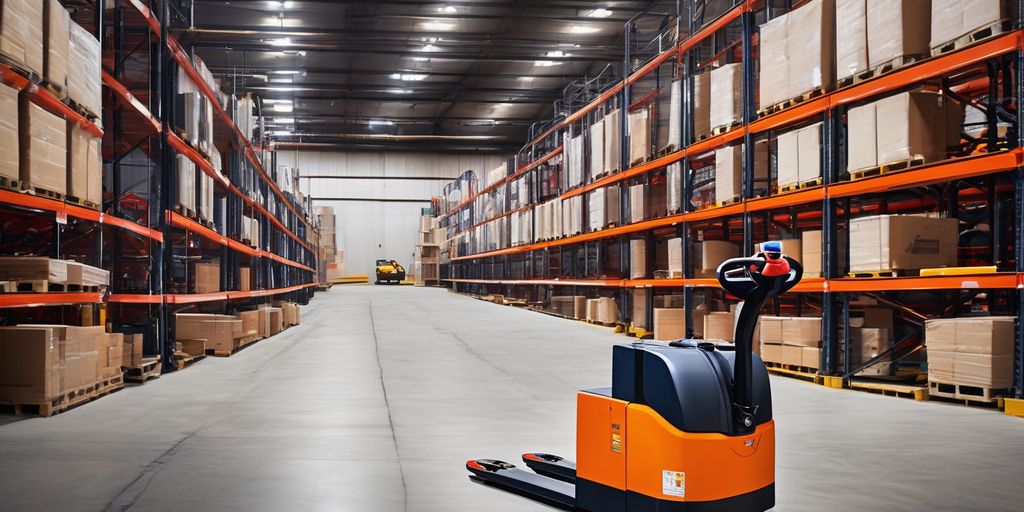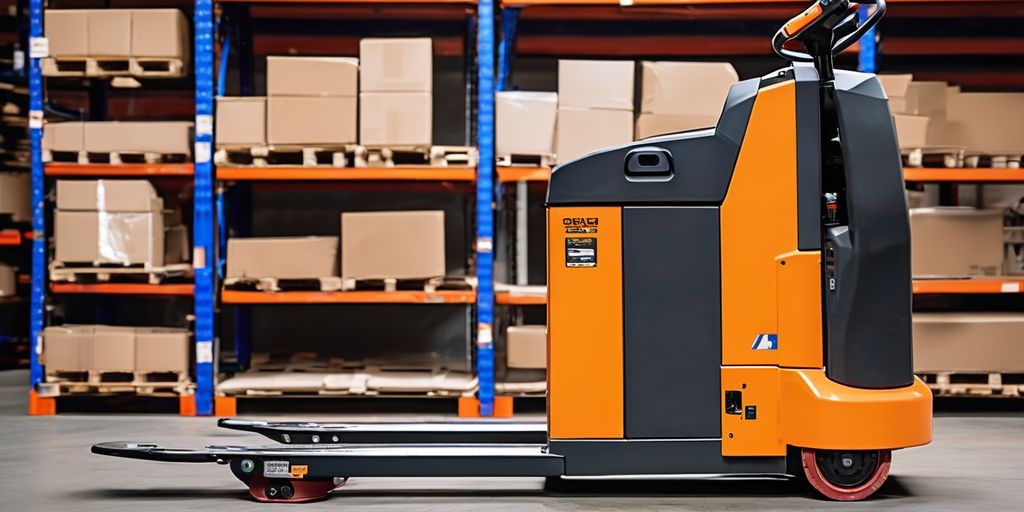The Role of Preventative Maintenance in Extending Forklift Lifespan — overview
Forklifts are essential tools in many industries, helping to move heavy loads and streamline operations. To keep these machines running smoothly and extend their lifespan, preventative maintenance is key. Regular checks and adjustments can catch problems early, saving time and money. This article will explore the importance of preventative maintenance for forklifts and how it can benefit your business.
Key Takeaways
- Regular inspections help catch problems early, preventing costly repairs.
- Using high-quality replacement parts ensures your forklift runs efficiently.
- Proper training for operators can lead to better daily maintenance practices.
- Following a preventative maintenance schedule can reduce downtime and increase productivity.
- Choosing a professional maintenance service provider can offer long-term benefits and reliability.
Importance of Regular Forklift Inspections
Regular forklift inspections are crucial for maintaining the safety and efficiency of your equipment. Much like regular health check-ups, these inspections help identify and address potential issues before they escalate into costly repairs or dangerous accidents. By maintaining a consistent inspection schedule, you can ensure that your forklifts remain in optimal condition, enhancing safety, reliability, and efficiency in your operations. Not only does this proactive approach save money, but it also extends the lifespan of your forklifts.
Identifying Potential Issues Early
Regular inspections help in spotting potential hazards and worn-out parts before they become serious problems. This early detection can prevent major breakdowns and ensure that the forklift is always ready for use.
Ensuring Optimal Performance
Consistent inspections improve forklift performance, ensuring optimal functionality and increased productivity. By keeping the equipment in top shape, you can avoid unexpected downtime and maintain a smooth workflow.
Compliance with Safety Standards
Regular inspections ensure that your forklifts comply with safety regulations, reducing the risk of accidents and legal issues. This not only protects your employees but also enhances the overall safety of your workplace.
Key Components of a Preventative Maintenance Program
Preventative maintenance is essential for keeping forklifts in top shape. Sticking to scheduled maintenance ensures efficiency and reliability, helping to avoid unexpected breakdowns.
Scheduled Maintenance Tasks
Regular maintenance tasks include:
- Checking fluid levels
- Inspecting belts and hoses
- Testing battery levels
- Inspecting hydraulics and seals
These tasks help identify small problems before they become bigger ones, saving time and money in repairs or replacements.
Use of High-Quality Replacement Parts
Using high-quality replacement parts is crucial. It ensures that the forklift operates smoothly and reduces the risk of malfunctions. Always opt for parts that meet or exceed the manufacturer's specifications.
Record Keeping and Documentation
Keeping detailed records of all maintenance activities is vital. It helps in tracking the forklift's condition and planning future maintenance. Proper documentation also ensures compliance with safety standards and can be useful for warranty claims.
Proper maintenance involves regular inspections of key components such as brakes, tires, hydraulic systems, and lifting mechanisms. Following a maintenance schedule helps in avoiding unexpected breakdowns and ensures the forklift is always ready for use.
Economic Benefits of Preventative Maintenance

Cost Savings on Major Repairs
Neglecting maintenance may save time and money in the short term, but it often leads to more significant expenses down the road. Preventive maintenance helps extend the lifespan of the equipment, reducing the need for premature replacements. Additionally, identifying and addressing minor issues before they become major problems can prevent costly breakdowns and repairs.
Maximizing Return on Investment
Performing this maintenance can mean extending the life of assets, increasing productivity, improving overall efficiency, and reducing maintenance costs. By investing in routine maintenance, businesses can enjoy the service advantage and stay ahead in today's competitive industrial landscape.
Reducing Downtime
Regular maintenance can save you money in the long run by helping to prevent costly repairs or replacements due to unexpected breakdowns or malfunctions. Proactive preventive maintenance can help identify small problems before they become bigger ones, saving you time and money in repairs or replacements.
Maintenance helps you avoid expensive repairs by addressing problems before they become significant. Repairing minor issues costs less than major issues. Additionally, when you fix minor problems as they arise, you prevent unexpected breakdowns. Unexpected breakdowns lead to emergency repairs and production shut-downs, which cost more than preventive maintenance.
Training Operators for Better Maintenance
Proper training for forklift operators is crucial for maintaining the equipment and ensuring safety. Well-trained operators can identify issues early and handle the forklift in a way that minimizes wear and tear. This not only extends the lifespan of the forklift but also reduces the likelihood of accidents.
Importance of Operator Training
Investing in comprehensive training programs for operators and technicians is essential. These programs should cover safe and efficient operation practices, as well as preventative maintenance techniques. By doing so, operators can help keep the equipment in top shape and avoid costly repairs.
Best Practices for Daily Checks
Operators should perform daily checks to ensure the forklift is in good working condition. These checks can include:
- Inspecting tires for wear and damage
- Checking fluid levels, such as oil and hydraulic fluid
- Ensuring all lights and signals are functioning
- Testing brakes and steering for responsiveness
Role of Operators in Maintenance
Operators play a significant role in the maintenance of forklifts. They are often the first to notice potential issues and can report them before they become major problems. Regular training and reminders about the importance of these checks can lead to better overall maintenance and a longer lifespan for the equipment.
Implementing a Preventative Maintenance Schedule

Creating a preventative maintenance schedule for forklifts is essential for ensuring their longevity and reliability. Following the manufacturer's recommendations is the first step in this process. These guidelines provide a baseline for the necessary maintenance tasks and their frequency.
Manufacturer's Recommendations
Manufacturers typically suggest maintenance intervals based on operating hours. For example, after a certain number of hours, you might need to apply lubricants and inspect major components. Sticking to these recommendations helps keep the warranty valid and ensures the forklift operates efficiently.
Customizing Maintenance Plans
While manufacturer guidelines are crucial, customizing your maintenance plan to fit your specific needs can further enhance efficiency. Consider factors like the environment in which the forklift operates and the intensity of its use. A tailored plan can address unique wear and tear issues that standard schedules might overlook.
Frequency of Maintenance Activities
Regular inspections and maintenance activities should be scheduled to catch potential problems early. Daily visual checks for leaks, loose parts, and damage are essential. More comprehensive inspections should be done at regular intervals by qualified technicians. This proactive approach helps in avoiding expensive accidents and unexpected breakdowns.
Implementing a well-structured maintenance schedule not only extends the lifespan of your forklifts but also maximizes efficiency and reduces downtime.
By following these steps, you can ensure that your forklifts remain in top condition, providing reliable performance and safety for years to come.
Common Forklift Issues Prevented by Regular Maintenance

Hydraulic System Failures
Regular maintenance is crucial in preventing hydraulic system failures. Proper maintenance involves regular inspections of key components such as brakes, tires, hydraulic systems, and lifting mechanisms. By following a maintenance schedule, you can avoid unexpected breakdowns and ensure the forklift is always ready for use.
Electrical System Malfunctions
Electrical system malfunctions can be a major headache. Regular checks help in identifying potential issues early, ensuring that the forklift operates smoothly. This proactive approach helps in reducing downtime and extending the equipment's lifespan.
Mechanical Wear and Tear
Mechanical wear and tear is inevitable, but regular maintenance can significantly slow it down. Scheduled inspections and preventative maintenance, such as oil changes and filter replacements, help catch small issues before they become larger, more expensive problems. This not only saves money but also keeps the forklift in optimal condition.
Without proper maintenance, these underlying issues can quickly escalate, resulting in costly breakdowns and operational downtime. Regular maintenance visits help identify and address problems before they become major issues, saving you from expensive repairs and downtime.
Choosing the Right Maintenance Service Provider
Selecting the right maintenance provider is crucial for ensuring quality forklift maintenance. Working with a reputable and experienced provider offers comprehensive services tailored to your needs, with trained technicians who can accurately diagnose and address forklift issues. They also guide scheduling maintenance visits to keep your forklifts running smoothly and efficiently.
Regular maintenance is essential for optimal forklift performance, extending its lifespan, and preventing unexpected breakdowns and costly repairs. Choosing the right provider ensures your forklift is properly serviced, giving you peace of mind. Experienced technicians can perform preventative maintenance and catch potential problems early, saving you time and money. Overall, a reliable maintenance provider is key to maintaining your forklift’s efficiency, safety, and longevity.
Conclusion
In summary, taking good care of your forklifts through regular preventative maintenance is key to making them last longer. Simple steps like routine checks, proper storage, and using good quality parts can make a big difference. By following these practices, you can avoid big problems and save money. Remember, a well-maintained forklift is not only safer but also more reliable and efficient. Investing time and effort into maintenance today will pay off with a longer-lasting, better-performing forklift in the future.
Frequently Asked Questions
What is preventative maintenance for forklifts?
Preventative maintenance involves regular checks and adjustments to keep forklifts running smoothly and catch potential problems early.
Why are regular forklift inspections important?
Regular inspections help identify issues early, ensure the forklift is working at its best, and make sure it meets safety standards.
What are some key components of a preventative maintenance program?
A good program includes scheduled maintenance tasks, using high-quality replacement parts, and keeping detailed records of all maintenance activities.
How does preventative maintenance save money?
It saves money by catching minor issues before they become major repairs, reducing downtime, and extending the life of the forklift.
Why is operator training important for forklift maintenance?
Training operators ensures they know how to perform daily checks and recognize potential problems, which helps in maintaining the forklift properly.
What common issues can regular maintenance prevent?
Regular maintenance can prevent hydraulic system failures, electrical system malfunctions, and mechanical wear and tear.




Leave a comment
This site is protected by hCaptcha and the hCaptcha Privacy Policy and Terms of Service apply.